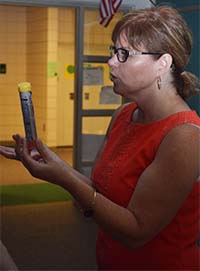During a back-to-school first-aid training session, Comstock Park Public Schools teacher’s aide Mandy Rodriguez learned how to administer an EpiPen, a device used to inject epinephrine to stop an allergic reaction that leads to throat swelling and can be life-threatening.
She said it’s nice to have the information in case of an emergency.

“Usually (support staff personnel) are the first ones that have to respond,” she said. “This session helps us help the child and respond as well as we can.”
The more trained professionals the better, said Comstock Park Public Schools nurse Tina Rodriguez. She’s seen a lot in her years treating students: out-of-control diabetes, seizures, anaphylaxis and concussions. But because she spreads her time among all the district schools, she can’t be the first responder to every medical need.
The longtime nurse hosted a session for about 20 support staff members to teach them to recognize high or low blood sugar, anaphylaxis and asthma symptoms, and how to respond when a child experiences those conditions, as well as seizures, diabetes, complications, an asthma attack or a head or neck injury. It’s an extension to training secretaries.
Oftentimes, it’s the aides who are on the playground or in the cafeteria when a child with a peanut allergy eats a peanut M&M or starts wheezing, or when a fall from the jungle gym results in a broken arm. So Rodriguez is also arming them with as much information as possible to be first responders.
“It is important for them to feel comfortable and be knowledgeable making that initial baseline evaluation of a student, whether it is related to an injury or an asthmatic student needing to use an inhaler,” she said.
Forty-nine students in the district have life-threatening allergies, 24 take medication for seizures and many are asthmatic. Rodriguez is employed through Spectrum Health, which places nurses in districts based on risk population and need.
“Support staff members also often work in special education classrooms where there are often medically fragile students,” she said. “The most important skill I can teach is to know when to seek additional medical help and assessment.”
CONNECT
Spectrum Health Advocacy Program









